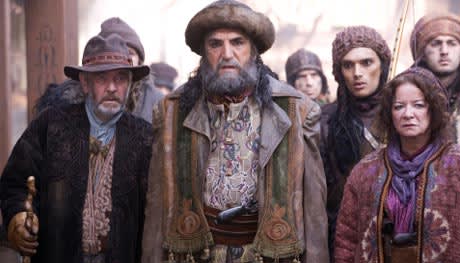This film adaptation, the first book in a childrens trilogy called His Dark Materials by Philip Pullman, has been getting a lot of attention for its so-called anti-religious stance (the books, yes; the film, not so much). But Pullman fans should be less worried about the protests from the Catholic church and more about director Chris Weitz. The American Pie director, who also adapted the screenplay, faces a serious challenge with this $150 million effort - the story features an alternate universe in which peoples souls are manifested outside their bodies in the form of animal daemons, so every single person on screen is accompanied by their own unique animal familiar, making every shot a potential CGI nightmare. Weitz manages the technical aspects well; its the storytelling that doesnt manage to bring this tale to appropriate life. Weitz gets so caught up in explaining this alternate universe that he bleeds the mystery and tension from the story itself; even the fact that there are alternate universes with similarities and great differences is an end-of-book revelation that Weitz casually reveals in an opening narration. Thats just one of the problems here. From the outset, it becomes very clear that this is just one part of a much larger narrative, and as such, forward momentum and end-of-film closure are sacrificed. Characters are introduced suddenly and without much care (especially as the film tries to gain momentum), and the urgency with which young protagonist Lyra Belacqua (newcomer Dakota Blue Richards) takes on her quest is stalled at several key points. Fans of the book will recognise key characters (like Daniel Craigs Lord Azriel, strongly introduced and then barely seen again), the malicious Mrs. Coulter (Nicole Kidman, looking beautiful but underserved by the story) and the deposed king of a tribe of armoured bears, but those unfamiliar with the story will wonder just whats going on by the films end. That the film asks big-picture narrative questions so fervently - like the nature of mystical "dust, a question that defines the entire trilogy - and then fails to answer them by films end only strengthens the sense that youre watching nothing more than a two-hour prequel for a part two and three that have not yet been made, unlike, say, Peter Jacksons ambitious Lord of the Rings undertaking. Rings, along with the worldwide success of the Harry Potter books and movies, is clearly the benchmark here, but Compass approaches neither the kid-friendly accessibility nor the groundbreaking filmmaking ambition. No doubt, His Dark Materials is a challenging piece of work to adapt for the screen; sadly, Weitzs failures here may result in stalling two more attempts.
The Golden Compass
Chris Weitz

BY James KeastPublished Dec 7, 2007